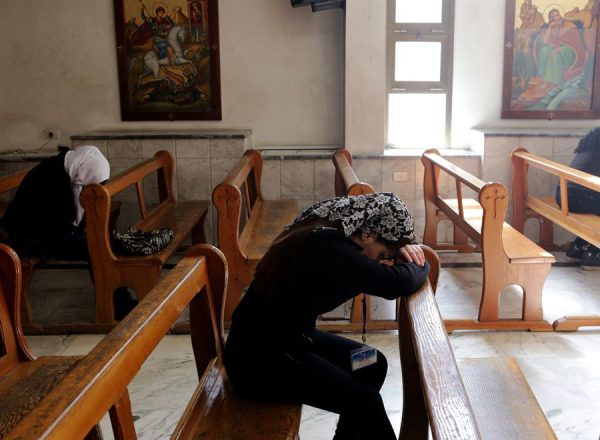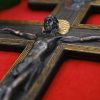Romans 12:6-14; Matthew 9:1-8
Today is “St. Timon Sunday” in our Diocese of Wichita and Mid-America, when we make an offering in support of our brothers and sisters in the Archdiocese of Bosra-Hauran in Syria. Under the guidance of His Eminence, Metropolitan Saba, the Archdiocese does all that it can to show the love of Christ to the victims of the brutal conflict of the last several years. The support provided by our Diocese has helped to fund a medical clinic and a pharmacy, and to make possible future plans for a kindergarten, a youth camp, and a monastery. Tragically, hundreds of thousands have died from the violence and millions are refugees or internally displaced persons. The human cost of such devastation is beyond calculation. Of course, we continue to pray in every service for Metropolitan Paul and Archbishop John, who were abducted in Syria in 2013.
We commemorate St. Timon today as one of the seventy apostles sent out by the Lord and one of the original deacons mentioned in Acts (Acts 6:5). He was the first bishop of what is now the city of Bosra, and he died as a martyr for Christ. He played a key role in evangelizing a region where our Lord Himself often ministered (Matt.4:25) and where St. Paul took refuge after he escaped from Damascus following his conversion. (Gal. 1:15-18) Especially as Antiochian Orthodox Christians, we must give thanks for how St. Timon’s ministry enabled the Church to flourish in ways from which we benefit to this very day. God used his work, along with that of so many generations of faithful Christians in Syria and elsewhere in the Middle East, to bring us into the fullness of the faith in the Orthodox Church.
In St. Timon’s ministry, as well as in the witness of Orthodox Christians in that part of the world across the centuries, we find a clear example of obedience to St. Paul’s teaching in today’s epistle reading: “Rejoice in your hope, be patient in tribulation, be constant in prayer. Contribute to the needs of the saints, practice hospitality. Bless those who persecute you; bless and do not curse them.” Since the rise of Islam in the 7th century, Christians in the region have carried a heavy cross as a “tolerated” minority community typically enduring persistent discrimination mixed with periods of brutal oppression. Throughout history and in our own time, many Middle Eastern martyrs and confessors have refused to deny Christ, regardless of the cost.
The ministries of the Archdiocese of Bosra-Hauran extend benevolence to anyone in need, as is typical of philanthropic efforts of the Orthodox Church, such as International Orthodox Christian Charities (IOCC). True Christians are not tribalistic and concerned only with the needs of people like them, either religiously or in other ways. Even as God’s love extends to all, those who are truly in Christ will share His love with everyone, especially those they are inclined for whatever reason to view as enemies and strangers. “Bless those who persecute you; bless and do not curse them” is a difficult teaching to obey, but remains a fundamental characteristic of the Christian life in all times and places.
Instead of responding in kind to their persecutors, the Christians of the Middle East continue to show their enemies the love of Christ. In this regard, our brothers and sisters in Syria provide a powerful example of following the Lord’s instruction to the paralyzed man in today’s gospel reading: “Rise, take up your bed and go home.” Christ’s restoration of the man’s ability to walk was a sign of His forgiveness of the man’s sins, of the healing of the corruption of his soul. The Lord commanded this fellow to get up and move on with his life by taking steps that were probably difficult for someone used to being paralyzed.
It is easy for anyone, including Christians, to remain paralyzed by fear, hatred, and resentment against those who have wronged us. In a fallen world in which Cain murdered his brother Abel, we find it strangely appealing to define ourselves over against those we consider “the other.” Whether as particular people or members of groups, we so often find ways to justify treating them as the embodiment of evil while we pat ourselves on the back for our great virtue. Since we each confess ourselves to be the chief of sinners in preparation to receive Communion, that attitude toward anyone is a sign of a spiritual disease for which we need healing. The ministries of the Archdiocese of Bosra-Hauran, and more generally the witness of Christians in the Middle East, stand as clear examples of refusing to remain paralyzed by the corruptions of sin. For instead of seeking vengeance for historic and contemporary wrongs, or at least ignoring the sufferings of those who are not part of the Christian community, they take difficult steps to love all their needy neighbors as Christ has loved them. In doing so, they move forward in a life of holiness and provide a brilliant icon of the peaceable reconciliation of the Kingdom of God. They take the steps they can to embrace the healing of the human person that the Savior has brought to the world.
It is possible, of course, to look at any large problem and to think that nothing we could do could possibly make much of a difference. Part of the reason that we may think that way is our own pride, for we assume that only something really great and impressive is worthy of our attention. That is also a way of excusing ourselves from the responsibility to rise up from our comfortable bed of spiritual weakness to take the faltering steps we are capable of toward the Kingdom of God. The Christians in Rome to whom St. Paul wrote were not powerful, wealthy, or famous. Nonetheless, he called them to be faithful in how they treated one another and those outside the community of faith. Despite what our prideful thoughts tell us, our calling is not to be in charge of the world and somehow to make history turn out right according to our own designs. It is simply to be faithful in the circumstances in which we find ourselves. If we refuse to offer our time, talents, and energy to serve Christ and our neighbors because we are waiting for a greater or more prominent opportunity, we will be in the same situation as the paralyzed man would have been had he refused to get out of his bed. It requires humility to accept the circumstances of our lives as the context in which we will find our salvation. And if we are not faithful in small things, we will never learn to be faithful in larger ones.
On “St. Timon’s Sunday,” we have the opportunity to offer what we can to God for the sake of our brothers and sisters in Syria. This is our opportunity to obey St. Paul’s instructions to “contribute to the needs of the saints” and give “in liberality.” Our participation in this offering over the years has enabled the Archdiocese of Bosra-Hauran to minister to the great needs of the residents of the area in practical, tangible ways such as a medical clinic and a pharmacy. This offering is also our opportunity to rise up from our beds of self-centeredness in gratitude as we give in support of those from whom we have received the great blessing of the Orthodox Christian faith.
If we are truly in Christ, we will not define ourselves essentially in terms of nationality, politics, race, class, or any other merely human distinction, but as members of His Body, the Church, in which such matters are irrelevant. If we are finding the healing of our souls in Christ, His love toward enemies, foreigners, and anyone in misery will become characteristic of us. We will pursue the path to His Kingdom by taking the humble steps we can toward becoming more like Him in holiness as we follow the example of St. Timon and the many generations of Middle Eastern Christians who have taken up their crosses in faithfulness to Christ and love toward their neighbors. By sharing our resources with them even in small ways, we will open our hearts more fully to the Savior Who not only forgives our sins, but empowers us to become living icons of His merciful love. Let us use this opportunity to serve Him in our brothers and sisters in Syria for our salvation.

















